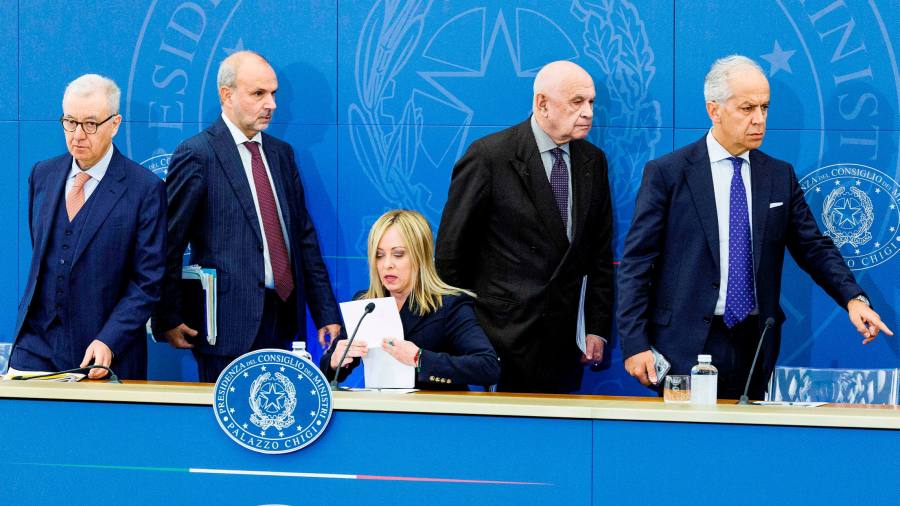
At Giorgia Meloni’s first cabinet meeting, the new prime minister sat in the middle of a large round table surrounded by over a dozen middle-aged men. The scene perfectly captured the lingering question among many voters and commentators: has the country’s first female prime minister broken the glass ceiling only for herself?
Meloni’s government has the lowest female representation — six ministers out of 24 — in a decade of Italian politics. While her election represents an important breakthrough in a male-dominated nation, the lack of women in her cabinet, let alone among her inner circle, may be an early insight into her self-consciously masculine leadership style.
Azzurra Rinaldi, gender economist at Università La Sapienza, finds these signals troubling. “We’ve seen more conservative and rightwing women reach top positions in Europe because they do not call into question traditional structures of power and society”, she says.
This sense was only reinforced when the new prime minister, a hardline conservative, announced that she wanted to be addressed as “Il Presidente del Consiglio”, with the masculine “il” article, as opposed to the feminine “la”, preceding her job title. Both articles are grammatically correct in this case, according to linguists at the Accademia della Crusca — the centuries’ old Italian institution that has the final word on semantic disputes. Originally, her office went even further by sending a formal communication to government departments that the prime minister should be addressed as “Il signor presidente”, or Mr President, before hastily backtracking.
Emiliana De Blasio, gender politics professor at Luiss University, suggests that Meloni is trying to position herself in opposition to a certain brand of leftwing feminism. “The message is: [masculine or feminine] doesn’t matter power is power,” she says. “But words matter because they shape politics and our societies.”
Many media outlets have refused to follow up on the descriptor request. “I would like to inform viewers that we will continue to address Meloni as ‘la presidente’ because we find this sort of [request to the contrary] anachronistic in 2022,” said Lilli Gruber, a veteran television anchor and former S&D MEP in Brussels, on her political talk show.
Some Italians complain that arguments over gender signifiers are petty at a time when Italy is grappling with rising inflation and rocketing energy prices. Others believe she is deliberately using the gender debate to deflect attention from policy difficulties. But Rinaldi warns that making the prime ministerial descriptor male risks taking Italian women “10 steps backwards” — and that a retrograde view of working women could have economic consequences too.
According to the Bank of Italy, if 60 per cent of Italian women were employed, as opposed to the current 50 per cent, the country’s gross domestic product would grow by 7 percentage points. Last year, the EU average female employment rate was 67 per cent. “[Meloni] is an expression of the most conservative party within the governing coalition, inspired by traditional values, where women are firstly and foremost mothers,” says Rinaldi.
The paradox is that the prime minister’s personal life tells a very different story. In her autobiography I am Giorgia, she describes how her mother worked in a variety of different jobs to sustain her two daughters after their father left. Meloni’s partner, Mediaset journalist Andrea Giambruno, recently offered a glimpse into their family life in an interview: “I work night shifts and this allows me to do the school drop offs and pick-ups.”
De Blasio and Rinaldi agree that while Meloni’s family life is exceptionally progressive by Italian standards, her political narrative appears to be the opposite.
“Rightwing women tend to focus on themselves, as opposed to the collective which is typical of the left — and they usually emerge in times of crises,” says De Blasio. “Meloni is still on a honeymoon with Italians and she’s hoping to extend it as much as possible, as the economic crisis looms.” The “cultural” message that will help her, she adds, “starts by changing the way we communicate”.